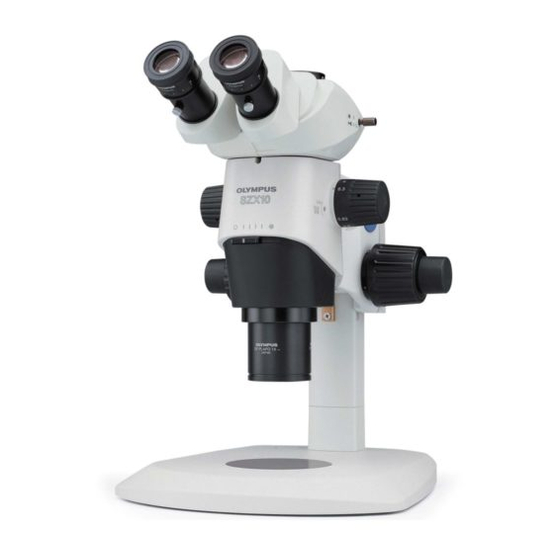Olympus SZX10 Manual de instrucciones - Página 6
Navegue en línea o descargue pdf Manual de instrucciones para Microscopio Olympus SZX10. Olympus SZX10 40 páginas. Research high-class stereo microscope
También para Olympus SZX10: Visión general (24 páginas), Manual de instrucciones (36 páginas)

1
Getting Ready
2
Downloaded from
ManualsNet.com
b
c
a
search engine
1. A microscope is a precision instrument. Handle it with care and
avoid subjecting it to sudden or severe impact.
2. Do not use the microscope where it is subjected to direct sunlight,
high temperature and humidity, or vibration. (For the operating
environment, see "6 Specifications" (P. 16).)
3. When moving the microscope, remove the specimen in advance.
Then, hold the front part of the base with one hand and hold
the rear part of the base with the other hand to avoid tilting the
microscope.
Also remove any module or attachment from the microscope to
minimize the weight before moving.
4. Observe the following cautions when operating the coarse focus
adjustment knob or the zooming knob.
Manipulated
Operation
Controls
Focusing
Coarse/fine focus
adjustment knobs
a
Zooming
Zooming knob
b
5. Only one intermediate attachment can basically be used, but two
attachments may also be used though the peripheral part of the
image may be obscured.
However, the coaxial vertical illuminator (SZX2-ILLC10) is not
considered to be an intermediate attachment.
When more than one intermediate attachment is to be
TIP
combined, they should be stacked according to the following
order, from the bottom to the top: SZX2-ILLC10, SZX-RFA, SZX-
SDO2, SZX-EPA.
Caution
1. If the knob hits the upper or lower
limiting mechanism violently or
it is rotated after it hits a limiting
mechanism, the internal mechanism
may be damaged.
2. If the knobs on the left and right
are rotated in opposite directions,
the internal mechanism will be
damaged. (The rotation tension
of the coarse focus adjustment
knob should be adjusted using the
rotation tension adjustment ring c
on the knob.)
1. If the knob hits the upper or lower
limiting mechanism violently or
it is rotated after it hits a limiting
mechanism, the internal mechanism
may be damaged.
2. If the knobs on the left and right
are rotated in opposite directions,
the internal mechanism will be
damaged.
